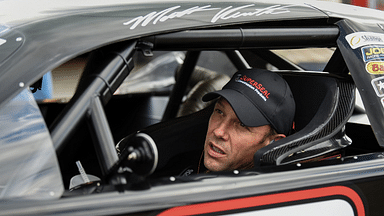Leah Pruett and Tony Stewart both stand at the stage of life where starting a family was no easy road. Pruett, still in her thirties, had stronger odds, but Stewart, at 54, only began thinking seriously about children after meeting his wife. Yet as a racer herself, Pruett understood the stakes; stepping out of the cockpit meant handing her car to someone else and facing an uphill battle to return. Still, the Stewarts knew what they wanted, so they went all in.
Advertisement
When Pruett announced last year that she would step away from drag racing to try for a child, Stewart slid into the driver’s seat. Expectations were tempered, as no one foresaw Stewart matching the craft of his seasoned wife. Yet he rose to the occasion, proving his mettle on the drag strip like every other time.
In 2025, Stewart made his name in the Top Fuel ranks with a breakthrough win at the Four-Wide Nationals in Las Vegas and capped it with the regular season championship. When the couple joined Shannon Spake’s podcast, Pruett shared how she wrestled with the choice between family and racing, admitting she had always loved children but rarely had the time while chasing trophies.
From the outset of their relationship, Pruett and Stewart laid their cards on the table. Within weeks, they agreed that children belonged in their future.
Still, Pruett opened up about the difficult side of the decision. “But one of the most difficult things was stepping outside of the race car, announcing it to the world… I plan to be in the hopes of, and we did have trouble on my own side to get pregnant. And having to do that because there was not any type of protocol in motorsports in place.”
She explained that motorsports had systems for injury or COVID, but none for pregnancy.
“I mean, we got pregnant and then in that time I was able to make a brand new rule with the policy change, basically, if a female driver gets pregnant during the season, that’s no different than injury protocol, a replacement driver can come in and carry on those same. So, because without that, you continuously always have to make that decision.”
Without such a safeguard, female racers would face an impossible choice: chase motherhood or continue climbing the ladder of motorsport.
Pruett also raised a broader issue, noting that while female drivers are often seen as more marketable, skepticism lingers behind the curtain. Teams worry about the risk of pregnancy pulling a driver off track, which in turn costs the company money. In those moments, the woman loses not only her seat but also the chance to prove her worth in the sport.







